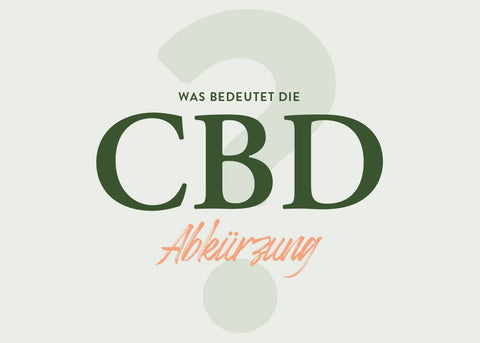In today's world, everyone is talking about CBD. But what does the abbreviation CBD actually mean? CBD stands for cannabidiol, which is one of the many compounds found in the hemp plant. Unlike THC, the psychoactive component of hemp, CBD does not cause intoxication and is therefore legally available.
Cannabidiol has received a lot of attention in recent years and is seen by many people as an alternative to traditional medication. It is often used to relieve pain, anxiety, and other health issues. But what exactly makes CBD so special and how does it work in the body? Read on to learn more about this fascinating connection.
The abbreviation CBD stands for cannabidiol, which is a natural component of the hemp plant. CBD is being studied and used for its potential health benefits, such as pain relief, relaxation, and anti-inflammatory. Unlike THC, another component of hemp, CBD has no psychoactive effects, meaning it won't get you high.

What does the abbreviation CBD mean?
If you're interested in the world of hemp products, chances are you've heard of CBD. It's an acronym that stands for cannabidiol, a compound extracted from the hemp plant. In recent years, CBD has attracted a lot of attention as it is touted as a natural alternative to traditional medicines to treat various medical conditions. But what exactly is CBD and what makes it so special? Here's everything you need to know about this fascinating connection.
What is CBD?
Cannabidiol, or CBD, is one of more than 100 compounds found in the hemp plant. Unlike tetrahydrocannabinol (THC), which has psychoactive effects and gets those who consume it “high,” CBD has no psychoactive effects. CBD doesn't affect the brain in the same way as THC, instead interacting with the body's endocannabinoid system, which is responsible for regulating various bodily functions such as sleep, mood, appetite, and pain perception.
Extracted from the hemp plant, CBD comes in a variety of forms, including oils, capsules, gummies, creams, and other topical products.
How does CBD work?
CBD affects the body in a number of ways. One of the most important effects of CBD is its interaction with the body's endocannabinoid system. CBD binds to certain receptors in the endocannabinoid system and can thus influence various bodily functions. For example, CBD can reduce pain perception, reduce inflammation, reduce anxiety, and improve sleep.
In addition, CBD can also affect the body in other ways. For example, it can increase the production of serotonin, a neurotransmitter responsible for regulating mood. It can also increase the production of GABA, a neurotransmitter responsible for regulating anxiety and stress.
What are the benefits of CBD?
CBD is used by many people to treat various medical conditions. Some of the most common uses of CBD are to relieve pain, reduce anxiety and depression, improve sleep, and reduce inflammation. CBD also has antioxidant properties that can help maintain cellular health and reduce the risk of disease.
CBD vs. THC
Although THC and CBD both come from the hemp plant, they have very different effects on the body. THC is psychoactive and can cause a high, while CBD has no psychoactive effects. THC can also cause unwanted side effects like anxiety, paranoia, and memory problems, while CBD is generally well tolerated and rarely causes unwanted side effects.
How is CBD used?
CBD comes in a variety of forms, including oils, capsules, gummies, creams, and other topical products. The way of use depends on the individual needs. For example, CBD oil can be placed under the tongue or used in foods and beverages. Capsules are taken like conventional dietary supplements. Topical products can be applied directly to the skin and can help reduce pain and inflammation.
What dosage of CBD is right?
The right dosage of CBD depends on various factors, such as body weight, the severity of the condition and the method of administration. It is important to start with a low dosage and observe the effects. The dosage can then be slowly increased until the desired effect is achieved. It is also important to follow the manufacturer's recommendations and seek advice from a doctor or qualified professional if necessary.
Is CBD legal?
In Germany, owning and selling CBD products is legal as long as they meet legal requirements. The products must have a THC content of less than 0.2% and must not have any psychoactive effects. However, it is important to educate yourself on local laws and regulations and to work with a reputable manufacturer to ensure the products are legal and safe.
What are the possible side effects of CBD?
CBD is generally well tolerated and rarely causes unwanted side effects. However, some people may be sensitive to CBD and experience side effects such as fatigue, diarrhea, or loss of appetite. It is important to increase the dosage slowly and monitor the effects to avoid unwanted side effects.
Conclusion
CBD is an intriguing compound derived from the hemp plant. It has many potential health benefits and is used by many people to treat various conditions. Although CBD is commonly associated with THC, it has no psychoactive effects and is generally well tolerated. If you're interested in trying CBD, it's important to educate yourself on proper dosage, local laws and regulations, and to go with a reputable manufacturer.
frequently asked Questions
Here are some frequently asked questions about the abbreviation “CBD”.
Question 1: What does the abbreviation CBD mean?
The abbreviation “CBD” stands for cannabidiol. It is a compound found in the hemp plant. This compound has no psychoactive effects, unlike THC, which is also found in the hemp plant.
CBD is often used as a dietary supplement or medicinally due to its many potential health benefits. It is also used in the cosmetics industry as it is believed to be anti-inflammatory and soothing to the skin.
Question 2: Is CBD legal?
Yes, CBD is legal in Germany as long as it is made from industrially grown hemp and the THC content is less than 0.2 percent. However, there are some restrictions, for example, the sale of CBD in food is not allowed.
It is important to note that CBD may be regulated differently in other countries, so it is important to check the laws in each country before purchasing or using CBD.
Question 3: How is CBD consumed?
There are many ways to consume CBD. Some popular methods include smoking or vaping CBD-rich cannabis, taking CBD oils or capsules, applying CBD creams or lotions to the skin, or adding CBD to food or drink.
It's important to note that how you consume CBD can affect the mode and duration of effects. Everyone also reacts differently to CBD, so finding the right dose and the best way to take it can take time.
Question 4: What are the health benefits of CBD?
There are many potential health benefits of CBD that are currently being studied. Some studies have shown that CBD can help treat anxiety, depression, pain, epilepsy, and Parkinson's disease.
However, there is still a lot of research needed to understand the exact effects of CBD on the human body. It is important to note that CBD should not be used as a substitute for medical treatment and that one should consult a doctor before using CBD, especially if one is taking other medications.
Question 5: Are there any side effects of CBD?
Although CBD is considered safe, some people may experience side effects, especially when taking high doses. Some possible side effects include fatigue, nausea, diarrhea, and loss of appetite.
It is important to note that CBD can affect the effects of other medications. If one is taking other medications, one should consult a doctor before using CBD to avoid possible interactions.

In conclusion, CBD is an acronym for cannabidiol and is a chemical compound derived from the hemp plant. It is often used for its medicinal properties and can offer a variety of benefits.
Often used as an alternative to traditional medicines, CBD has a promising future in medicine. It has been shown to be effective in treating pain, anxiety, depression and other conditions.
Overall, CBD is a promising treatment option for people looking for alternative and natural remedies. It is important to note that CBD is not psychoactive and thus does not have euphoric effects. If you are interested in learning more about CBD, speak to a qualified doctor or alternative medicine professional.


